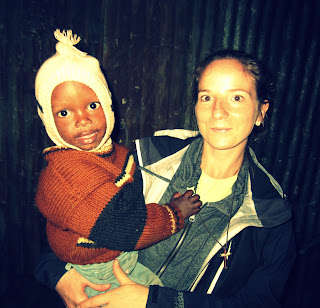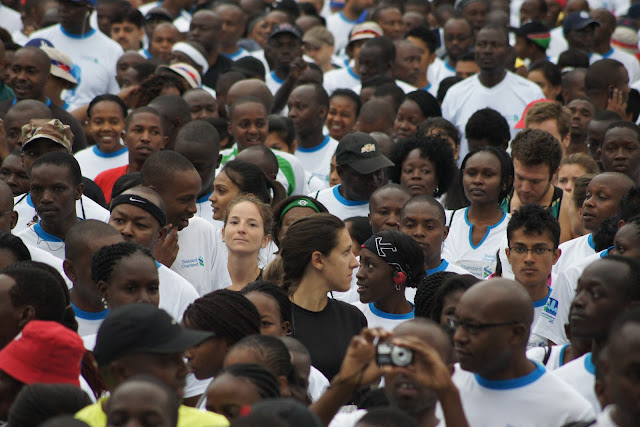This blog is a little different in nature because we are using it more as a plea for help than a fun or interesting story. We are asking for your help.
We have come to know a woman here over the last few months who has really touched our hearts. Her name is Anita. She lives in our neighborhood in Ongata Rongai. After spending some time with her, she disclosed to us that she is HIV positive. She contracted HIV after she was raped 17 years ago. She also got pregnant. Her daughter is now in high school. As is the vicious cycle for many young girls growing up in poverty and without a father, her daughter, Katherine recently got pregnant too.
Anita is a seamstress by trade. The only school she ever went to was to learn how to sew. She now ekes out her meager existence pumping out odd jobs on her foot-powered sewing machine in her one-room tin shack. Finding work is hard. Supporting her family is even harder. She is surviving on less than $50 a month.
We went to visit Anita today. She was sitting outside her house crying. She is overwhelmed. Knowing the importance of education, she is insisting that her daughter return to boarding school in January, right after she is due to give birth (most high school aged children are sent away for boarding school; this is not considered a privilege or a punishment in Kenya). She informed us that she plans on shouldering the load of raising this baby, her grandchild, by herself. “My daughter needs to be in school. I am willing to sacrifice anything to see her stay in school.”
We asked her how she was going to afford it. She said, “By faith.” We asked her, when her daughter leaves to go back to school and isn’t around to breastfeed, how would she feed the child? She said “I’ll buy milk at the store.” And we’re not talking about baby formula milk here; we’re talking about unpasteurized cow milk from a plastic bag.
Formula is available here, but it’s expensive: around $10 for a can, and only available in the supermarkets. This is simply not realistic for a woman in Anita’s position to be able to afford. We asked Anita if she had any other supplies to take care of the baby. She said no. Now when I talk about “supplies,” I’m not referring to a crib, a carseat, or a stroller; I’m talking about a blanket, clothes, and diapers. Essentials. She has nothing for this baby.
We prayed with her for provision, and we know very well that God often provides for people’s needs through the generosity of others.
We asked Anita if we could tell her story, and make this plea for help to our friends. She agreed. So we are asking you, as our friends and family, to help this sister from another country. This is about the life and health of a child. This is about the education of a young woman. This is about helping a family who is not in the position to be able to help themselves.
If you are interested in helping and encouraging Anita and her family, please do one of two things: We think it would be really powerful if you would write Anita or Katherine a letter of encouragement during this really difficult and stressful time. Send letters to us via e-mail or Facebook and we will print them off for them. Second, support Anita and her grandbaby financially by clicking the “Donate” button on the upper-righthand side of this page. This sends money directly to us via PayPal. If you would like your donation to be sent through a 501(c)(3) certified organization, please send checks to our church in Delaware at:
Lewes Church of Christ
15183 Coastal Hwy
Milton, DE 19968
Every penny that is sent will be used to pay for formula and other supplies for this baby. One of our strongest held beliefs is that we are blessed so that we can pass that blessing forward. Our goal is to be able to help support this child for the first six months of his/her life as this woman gives up everything she knows in order to raise her grandchild and ensure that her daughter is able to complete her high school education.
Thank you for your generosity.
Thank you for your generosity.
“You will be enriched in every way so that you can be generous on every occasion, and through us your generosity will result in thanksgiving to God. This service that you perform is not only supplying the needs of the Lord’s people but is also overflowing in many expressions of thanks to God” (2 Corinthians 9:11-12).












































